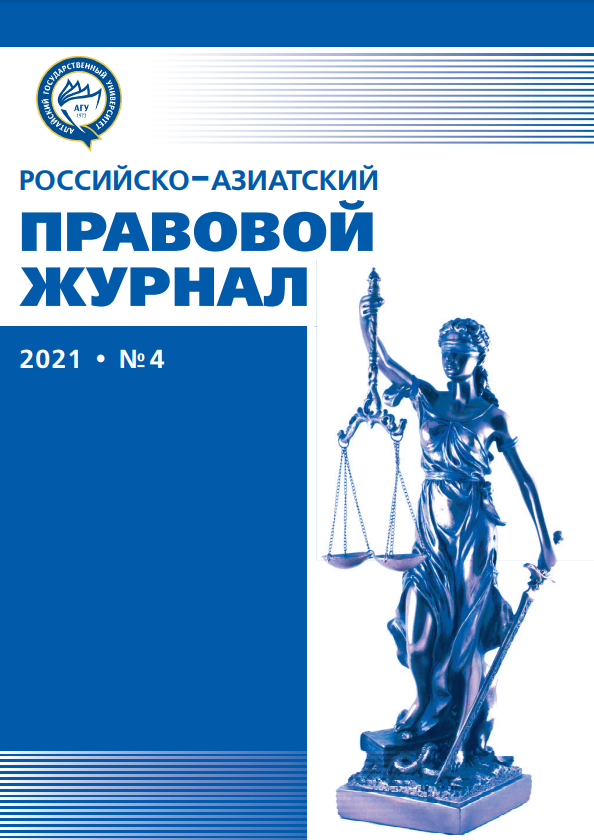PROSPECTS FOR INTERNATIONAL SCIENTIFIC AND SCIENTIFIC-TECHNICAL COOPERATION IN THE CONTEXT OF THE NEW TECHNOLOGICAL REALITY
УДК 340 ББК 67.5
Abstract
The research is aimed at finding ways to fill the regulatory vacuum in which digital technologies develop.The article provides an assessment of the positive and negative impact of digitalization on public relations,highlights the problems associated with the legal regulation of public relations complicated by the use ofdigital technologies or the participation of artificial intelligence, analyzes the degree of knowledge of theproblem in legal science and the proposed models of legal regulation of digitalization. The authors haveconcluded that the development of digital technologies demonstrates a long-term trend towards a decreasein the protective abilities of existing legal institutions, and therefore, a public request is formed for theisolation in the system of international scientific law of a set of legal norms regulating scientific and technicalcooperation in the digitalization of science and study of informatization processes.
Downloads
References
Росс А. Индустрии будущего. М. : АСТ, 2017.
Архипов В.В. Интернет-право: учебник и практикум для бакалавриата и магистратуры. М. : Юрайт, 2018. 249 с.
Киселев А.С. История зарождения и формирования идеи электронного управления государственными делами в России и за рубежом: сравнительноправовой аспект // Вестник Саратовской государственной юридической академии. 2017. №4. С. 39–45.
Aletras N., Tsarapatsanis D., Preoţiuc-Pietro D., Lampos V. (2016). Predicting Judicial Decisions of the European Court of Human Rights: A Natural Language Processing Perspective. Peer J Computer Science. 2 (2).
О национальных целях и стратегических задачах развития Российской Федерации на период до 2024 года : Указ Президента РФ от 07.05.2018. № 204. URL: https://mvd.consultant.ru/documents/1056500? items=1&page=1 (дата обращения: 30.11.2021).
О Стратегии развития информационного общества в Российской Федерации на 2017– 2030 годы : Указ Президента РФ от 09.05.2017. №203. URL: http://www.kremlin.ru/acts/bank/41919(дата обращения: 30.11.2021).
В России появилась концепция первого в мире закона о робототехнике. URL: http://science.spb.ru/allnews/item/6648-v-rossii-poyavilas-kontseptsiya-pervogo-v-mire-zakona-o-robototekhnike(дата обращения: 30.11.2021).
Морхат П.М. Искусственный интеллект. Правовой взгляд. М., 2017.
Исследовательский центр проблем регулирования робототехники и искусственного интеллекта. URL: http://robopravo.ru/ (дата обращения: 30.11.2021).
Васильев А.А., Шпопер Д., Матаева М.Х. Термин искусственный интеллект в российском праве: доктринальный анализ // Юрислингвистика. 2018. №7–8. С. 33–44.
Поляков В.В. Криминалистическая структура мер предупреждения компьютерных преступлений // Библиотека криминалиста: научный журнал. 2013. №5 (10).
Russian-Asian Law Journal is a golden publisher, as we allow self-archiving, but most importantly we are fully transparent about your rights.
Authors may present and discuss their findings ahead of publication: at scientific conferences, on preprint servers, in public databases, and in blogs, wikis, tweets, and other informal communication channels.
Russian-Asian Law Journal allows authors to deposit manuscripts (currently under review or those for intended submission) in non-commercial, pre-print servers such as ArXiv.
Authors who publish with this journal agree to the following terms:
- Authors retain copyright and grant the journal right of first publication with the work simultaneously licensed under a Creative Commons Attribution License that allows others to share the work with an acknowledgement of the work's authorship and initial publication in this journal.
- Authors are able to enter into separate, additional contractual arrangements for the non-exclusive distribution of the journal's published version of the work (e.g., post it to an institutional repository or publish it in a book), with an acknowledgement of its initial publication in this journal.
- Authors are permitted and encouraged to post their work online (e.g., in institutional repositories or on their website) prior to and during the submission process, as it can lead to productive exchanges, as well as earlier and greater citation of published work (See The Effect of Open Access).








